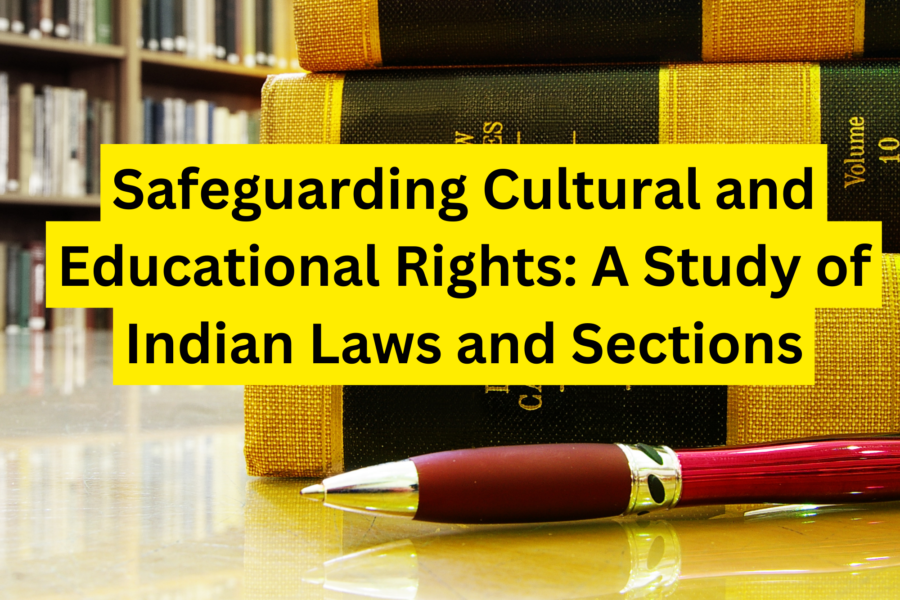Cultural and educational rights are fundamental pillars of any democratic society, serving as the cornerstone for the preservation and promotion of diverse cultures and knowledge systems. In India, a country renowned for its rich cultural tapestry and ancient educational heritage, these rights hold immense significance. This article delves into the legal framework surrounding cultural and educational rights in India, exploring the constitutional provisions, statutes, and landmark judicial decisions that shape these rights.
Constitutional Provisions:
The Indian Constitution, adopted in 1950, enshrines various provisions safeguarding cultural and educational rights. Articles 29 and 30 serve as the primary constitutional safeguards in this regard. Article 29 ensures the protection of the interests of minorities by providing them with the right to conserve their distinct language, script, or culture. Meanwhile, Article 30 guarantees the right of minorities, whether based on religion or language, to establish and administer educational institutions of their choice.
Interpretation and Implementation:
Over the years, Indian courts have played a pivotal role in interpreting and upholding cultural and educational rights. Landmark cases such as the T.M.A. Pai Foundation v. State of Karnataka and the St. Stephen’s College v. University of Delhi have provided significant insights into the scope and limitations of these rights. The judiciary has consistently emphasized the importance of autonomy for educational institutions while also ensuring that they adhere to certain norms and standards, particularly concerning reservation policies and inclusivity.
Legislative Framework:
Apart from constitutional provisions, various legislative enactments further strengthen cultural and educational rights in India. The Right of Children to Free and Compulsory Education Act, 2009 (commonly known as the RTE Act) is a crucial legislation aimed at ensuring free and compulsory education for children aged 6 to 14 years. Additionally, the Protection of Children from Sexual Offences (POCSO) Act, 2012, and the Juvenile Justice (Care and Protection of Children) Act, 2015, address the protection and well-being of children, thus indirectly contributing to their educational rights.
Challenges and Concerns:
Despite the legal framework in place, several challenges persist in safeguarding cultural and educational rights in India. One of the primary concerns is the issue of access and equity, particularly in remote and marginalized communities. Socio-economic disparities often hinder the realization of these rights, leading to unequal educational opportunities. Furthermore, instances of cultural intolerance and discrimination pose significant obstacles to the preservation of diverse cultural identities.
The Way Forward:
Addressing these challenges requires a multi-faceted approach involving legislative reforms, public awareness campaigns, and community empowerment initiatives. Strengthening the implementation mechanisms of existing laws, promoting inclusive educational practices, and fostering intercultural dialogue are essential steps towards safeguarding cultural and educational rights in India. Additionally, empowering marginalized communities and providing them with adequate resources and support can help bridge the existing gaps in access and equity.
Conclusion:
Cultural and educational rights form the bedrock of a vibrant and inclusive society, reflecting the values of diversity, tolerance, and equality. In India, these rights are enshrined in the Constitution and supported by various legislative measures. However, ensuring their effective implementation remains a pressing challenge. By addressing the underlying socio-economic barriers, promoting inclusive educational practices, and fostering a culture of respect and understanding, India can truly uphold its commitment to safeguarding cultural and educational rights for all its citizens.
Adv. Khanak Sharma


Love the seasonal health tips they offer.
lisinopril weight gain
The best in town, without a doubt.
They always keep my medication history well-organized.
gabapentin otc
Their digital prescription service is innovative and efficient.
Their commitment to global excellence is unwavering.
lisinopril weight gain
Always on the pulse of international healthcare developments.
They maintain a high standard of hygiene and cleanliness.
where can i get clomid tablets
The pharmacists are always updated with the latest in medicine.
A reliable pharmacy that connects patients globally.
can you take buspar with gabapentin
Always leaving this place satisfied.